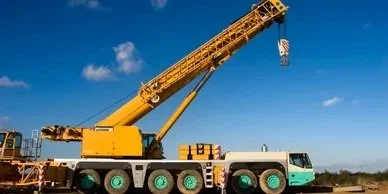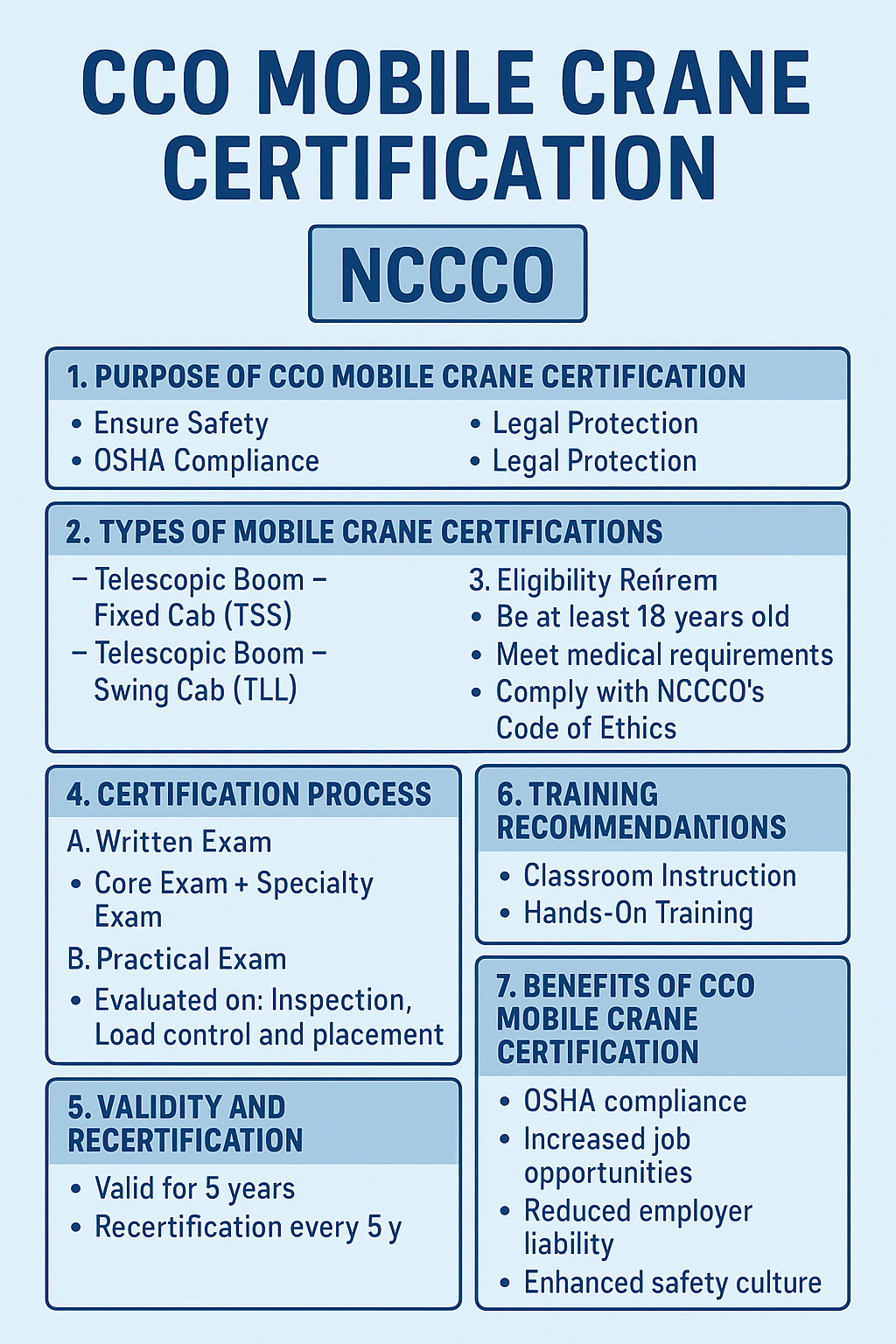
Nationwide Onsite Training
OSHA Approved Certified Crane Training: personalized training for your company or yourself.
Crane Operator School at Partner Locations
Train your team quickly with flexible on-site or virtual company training. With our Accredited CCO Mobile Crane certification training course.
Achieve certification or qualification at your own pace with our personalized training options.
When it comes to your career, our premier CCO Mobile Crane Training Program is designed to ensure you have the knowledge and skills needed for success within the crane industry. When it comes to the field of crane operation, you will enjoy a lifetime of job security as you build on construction projects that shape the world. 3P Safety's comprehensive CCO Mobile Crane Training combines world-class training with our hands-on experience and industry-leading classroom instruction, ensuring you master the skills necessary to perform in the industry and achieve the required qualifications for CCO Mobile Crane Training operations. With industry-leading certifications through CCO, 3P Safety, CCO Mobile Crane Training ensures you have the skills and confidence to operate Mobile Cranes and make a significant impact in the construction industry. Join us today and take your career and life to new heights.
5-Day NCCCO Mobile Crane Operator Training Program
Comprehensive Certification & Safety Training – 3P Safety
Program Overview
The 5-Day NCCCO Mobile Crane Operator Training Program is an intensive course designed to prepare crane operators for NCCCO (National Commission for the Certification of Crane Operators) certification in Telescopic Boom Cranes – Fixed Cab (TSS) and Swing Cab (TLL).
The program blends classroom instruction, hands-on operation, safety training, and exam preparation to ensure candidates meet OSHA 29 CFR 1926.1427 qualification requirements. By the end of this course, trainees will have the knowledge, skills, and confidence to operate mobile cranes safely, perform pre-operational inspections, read and interpret load charts, and pass the NCCCO written and practical exams.
Duration: 5 Days (Approximately 50–60 Contact Hours)
Class Size: 4–8 Students (Ideal for hands-on instruction)
Prerequisites:
Minimum 18 years old
Physically capable of operating a crane
Basic understanding of construction terminology and safety principles
Training Goals
Upon completion of this 5-day program, trainees will be able to:
Demonstrate knowledge of mobile crane components, terminology, and functions.
Perform pre-operational inspections and recognize unsafe conditions.
Understand and comply with OSHA and ASME/ANSI standards for crane operations.
Calculate load weights, center of gravity, and apply load chart data correctly.
Execute safe lifting operations, including rigging and signaling.
Successfully pass the NCCCO written and practical exams for TSS and TLL certifications.
Day 1: Safety, Regulations, and Crane Fundamentals
Classroom (8 Hours)
Morning Session (Safety & Regulations)
Introduction to NCCCO and certification requirements
OSHA 29 CFR 1926.1400 Subpart CC overview
Power line safety and minimum approach distances
Site hazard identification and lift planning
PPE requirements and safe work practices
Afternoon Session (Crane Fundamentals)
Introduction to mobile crane types: TSS vs. TLL
Basic crane components and functions:
Carrier, upperworks, boom, jib, counterweights
Wire rope, blocks, hooks, and sheaves
Load Moment Indicator (LMI) and anti-two-block devices
Crane terminology and load dynamics (center of gravity, radius, tipping axis)
Hands-On Activity:
Walk-around inspection of a mobile crane, identifying components and safety devices
Review of safety decals, warning labels, and operator’s manual
End-of-Day Assessment: 15-question quiz on safety and crane components
Day 2: Rigging & Signal Person Training
Classroom & Field (8 Hours)
Morning Session (Rigging Fundamentals)
Sling types and inspection (wire rope, chain, synthetic)
Hitch types: vertical, choker, basket
Rigging hardware: shackles, hooks, eyebolts, master links
Load weight calculation and center of gravity determination
OSHA and ASME B30.9 rigging safety standards
Afternoon Session (Signal Person Training)
Standard hand signals (per ASME B30.5)
Voice and radio communication protocols
Blind lift coordination and signaler/operator teamwork
OSHA Subpart CC signal person qualification requirements
Hands-On Activity:
Rigging and lifting a test load using proper hardware and signals
Practicing hand signals and radio calls with the operator in simulated scenarios
End-of-Day Assessment: Practical evaluation of sling selection and hand signaling
Day 3: Load Charts, Pre-Operational Inspections & Setup
Classroom & Field (8–10 Hours)
Morning Session (Load Charts & Capacity Calculations)
How to read a mobile crane load chart
Fixed cab vs. swing cab chart differences
Calculating rated capacities based on:
Boom length and angle
Radius and outrigger configuration
Multi-part line reeving and deductions for blocks & rigging
Capacity reduction factors: side loading, wind, and pick-and-carry operations
Afternoon Session (Pre-Operational Inspections & Setup)
Daily and shift inspections:
Hydraulic systems, wire rope, sheaves, hooks, electrical components
Safety devices: LMI, RCI, anti-two-block, outrigger interlocks
Crane setup procedures:
Outrigger placement, cribbing, and ground bearing calculations
Leveling and lift area barricading
Pre-lift meeting and communication plan
Hands-On Activity:
Perform a full pre-operation inspection of the training crane
Practice proper outrigger setup and machine leveling
End-of-Day Assessment: Written exercise on load chart problem-solving
Day 4: Mobile Crane Operations & Practical Exam Preparation
Field-Focused (10 Hours)
Morning Session (Basic Operations)
Smooth startup and shutdown procedures
Booming up/down, telescoping, and swinging the load
Hoisting and lowering loads with controlled movements
Traveling with a load (TLL cranes only)
Afternoon Session (Advanced Operations & NCCCO Practical Prep)
Simulated NCCCO practical exam course:
Zig-zag corridor travel
Precision load pick, swing, and placement
Stop, hold, and control exercises
Evaluation of operator accuracy, smoothness, and safety compliance
Hands-On Activity:
Each trainee performs a series of practical exercises under instructor supervision
Feedback and correction of unsafe practices or test errors
Day 5: Review, Written Exam Simulation & Final Practical
Classroom & Field (8–10 Hours)
Morning Session (Written Exam Preparation)
Core exam review:
Safety, site hazards, load dynamics
Crane components & operational aids
Specialty exam review (TSS & TLL):
Load chart interpretation and capacity calculation problems
Deduction exercises for rigging, blocks, and jibs
Timed practice written exam with instructor feedback
Afternoon Session (Final Practical & Evaluation)
Mock NCCCO practical exam using official course layout
Evaluation on:
Pre-operation inspection
Smooth operation and control
Accuracy of load placement and obstacle navigation
Instructor debrief and individual readiness assessment
Completion Requirements:
Passing score on internal written and practical assessments
Demonstrated competency in safe mobile crane operation
Recommendation for NCCCO Written & Practical Exams
Program Completion & Certification Path
Upon completing this 4 to 5-day program, trainees will receive a 3P Safety Mobile Crane Operator Training Certificate acknowledging OSHA-compliant training.
Next steps for certification:
Schedule and take the NCCCO written exam (Core + TSS/TLL Specialty).
Complete the NCCCO practical exam on the appropriate crane type.
Maintain compliance with NCCCO recertification (every 5 years).
Payments Accepted
A little about us.
AT 3PSafety's. We strive to deliver the highest standard of quality training, staffing, and inspections with our fully certified team. We thoroughly vet every employee to ensure you receive the highest standards and service.
Contact Us
Phone: 252-229-5238
Email patrick.salazar@3psafety.net



